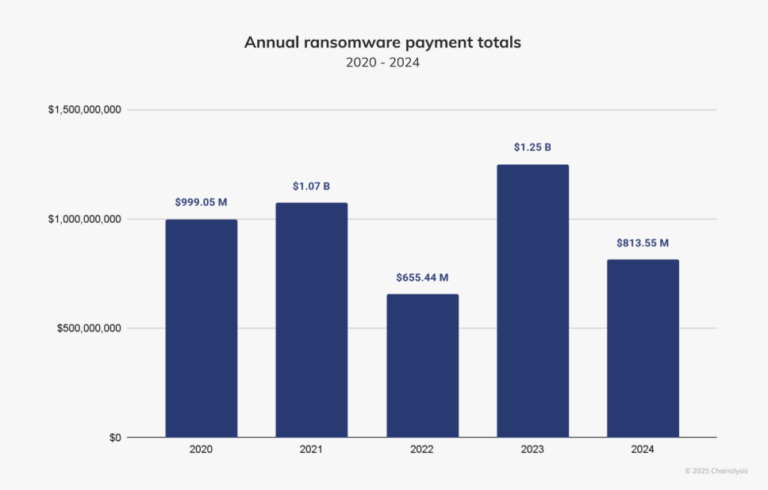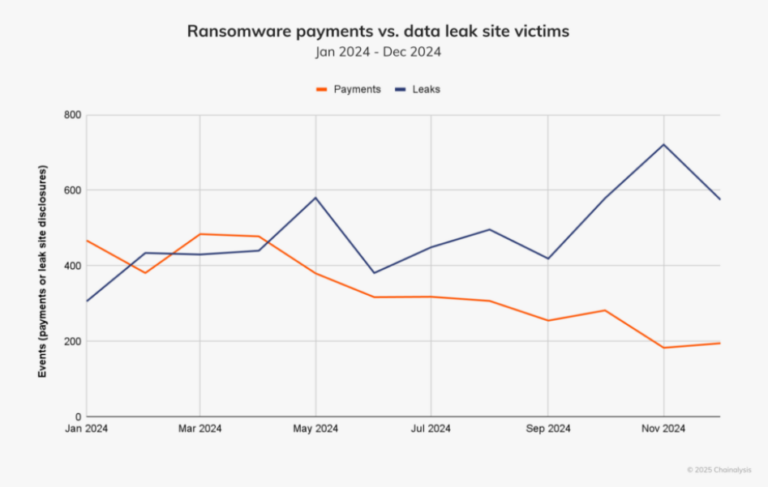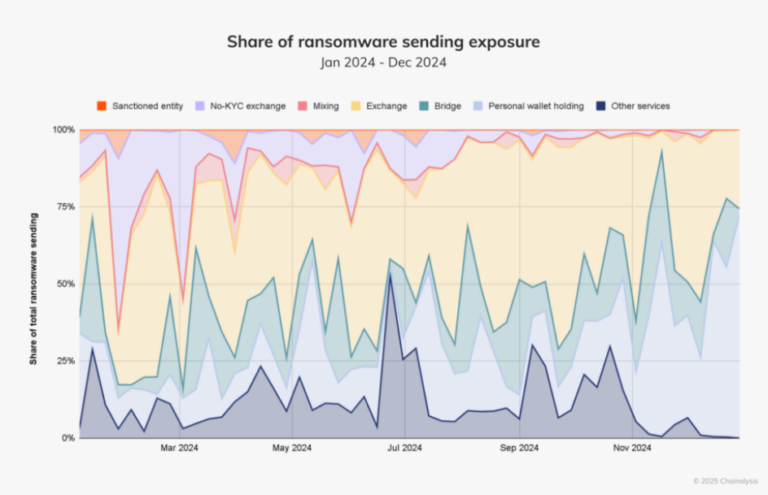Coinspeaker
Ransomware Extortion Falls 35% in 2024 Crackdowns and Resistance Rise: Chainalysis
International ransomware extortion funds plunged 35% in 2024, dropping to $813 million from the record-breaking $1.25 billion seen in 2023, based on blockchain analytics agency Chainalysis. The decline adopted aggressive crackdowns on illicit crypto exchanges and a rising variety of victims refusing to pay.

Supply: Chainalysis
Between January and June, attackers extorted $459.8 million, reflecting a modest 2.38% rise from the primary half of 2023. Nonetheless, the latter half of the 12 months noticed a pointy reversal, with funds falling by practically 35%. Essentially the most notable outlier was a $75 million ransom paid to the cybercriminal group Darkish Angels.
“This slowdown is just like the HoH decline in ransom funds since 2021 and the general decline throughout H2 2024 in some forms of crypto-related crime, reminiscent of stolen funds. Notably, the decline this 12 months is extra pronounced than within the final three years,” said Chainalysis.
Regulation enforcement actions performed a essential function within the downturn. A significant disruption focused LockBit, as soon as a dominant ransomware pressure, resulting in a staggering 79% drop in funds in the course of the 12 months’s second half. A joint operation between the UK’s Nationwide Crime Company (NCA) and the US FBI dismantled components of the group’s infrastructure, severely limiting its operations.
New Teams Fill the Void Left by Main Takedowns
LockBit’s decline, together with the collapse of BlackCat/ALPHV in January 2024, created an influence vacuum within the ransomware panorama. Smaller teams tried to grab management, however none matched the size of their predecessors. RansomHub, nonetheless, shortly rose to prominence, absorbing many displaced cybercriminals. Regardless of launching in February, it grew to become probably the most lively ransomware pressure by sufferer rely, securing a spot among the many prime 10 extortion teams of the 12 months.

Supply: Chainalysis
New gamers additionally emerged on the information leak entrance. 56 contemporary information leak websites appeared in 2024, greater than double the earlier 12 months’s quantity. Nonetheless, many of those have been misleading—over 100 victims have been listed a number of occasions throughout totally different platforms, and LockBit falsely claimed as much as 68% of its listed victims. Cybercriminals exaggerated their attain to take care of relevance regardless of elevated enforcement stress.
Whilst new threats surfaced, victims grew extra immune to paying. The latter half of the 12 months noticed a 53% hole between ransom calls for and precise funds. Solely 30% of negotiations resulted in funds, a stark distinction to earlier years. Extra corporations opted for backups, decryption instruments, or different restoration strategies as a substitute of giving in to extortion.
Ransomware Laundering Faces Rising Challenges
With enforcement ramping up, cybercriminals discovered it more and more troublesome to launder extorted funds. Centralized exchanges processed 39% of ransomware proceeds in 2024, barely above the four-year common of 37%. Nonetheless, the usage of crypto mixers—as soon as a well-liked laundering device—dropped sharply as a consequence of actions towards platforms like Chipmixer, Twister Money, and Sinbad.

Supply: Chainalysis
“Curiously, ransomware operators, a primarily financially motivated group, are abstaining from cashing out greater than ever. We attribute this largely to elevated warning and uncertainty amid what might be perceived as legislation enforcement’s unpredictable and decisive actions concentrating on people and companies collaborating in or facilitating ransomware laundering, leading to insecurity amongst menace actors about the place they will safely put their funds,” the report stated.
No-KYC crypto exchanges, a popular channel for laundering illicit funds, additionally took a success. A significant legislation enforcement operation in September 2024 noticed German authorities seize 47 Russian-language exchanges working with out Know-Your-Buyer (KYC) necessities. The crackdown considerably lowered ransomware-related inflows to those platforms, forcing cybercriminals to discover various laundering strategies.
Additional tightening the online on ransomware actors, Israeli-Russian citizen Rostislav Panev was arrested for creating instruments utilized by LockBit and receiving roughly $230,000 in Bitcoin. His seize additional crippled LockBit’s tried resurgence and highlighted the rising effectiveness of blockchain-based legislation enforcement investigations.
nextRansomware Extortion Falls 35% in 2024 Crackdowns and Resistance Rise: Chainalysis
[ad_2]
Source link


